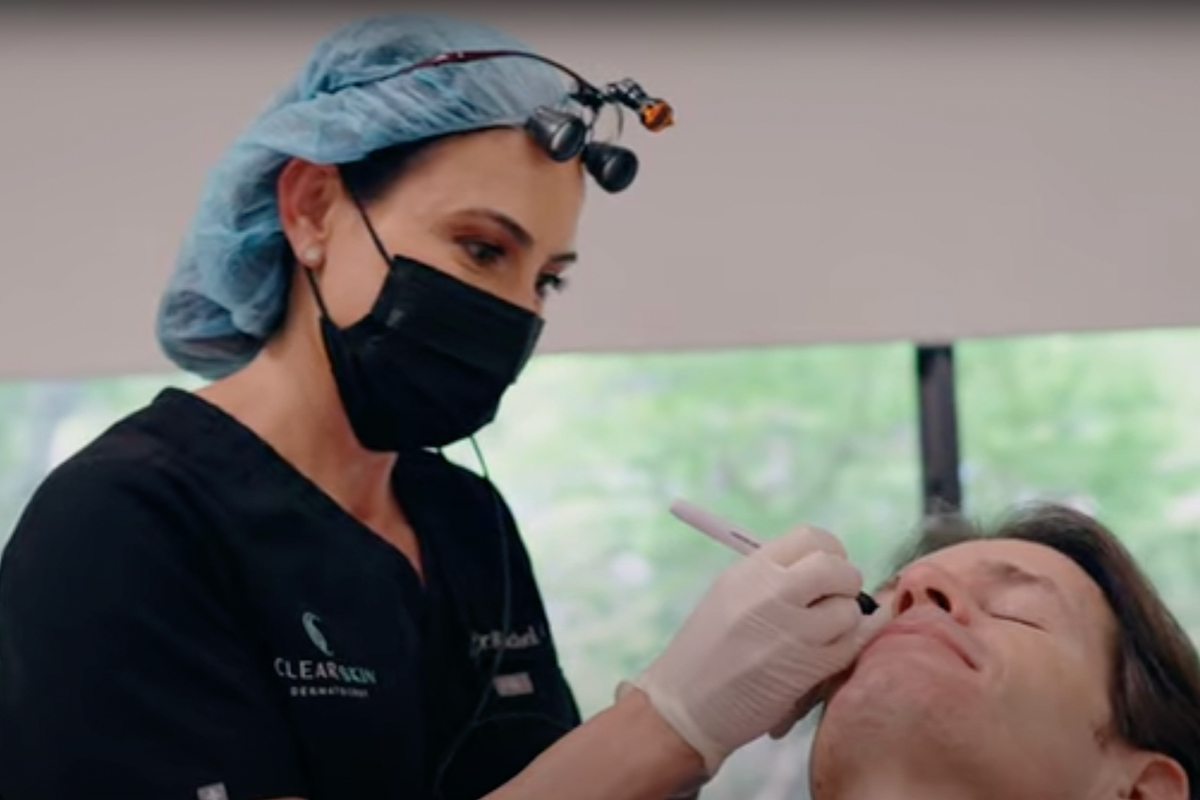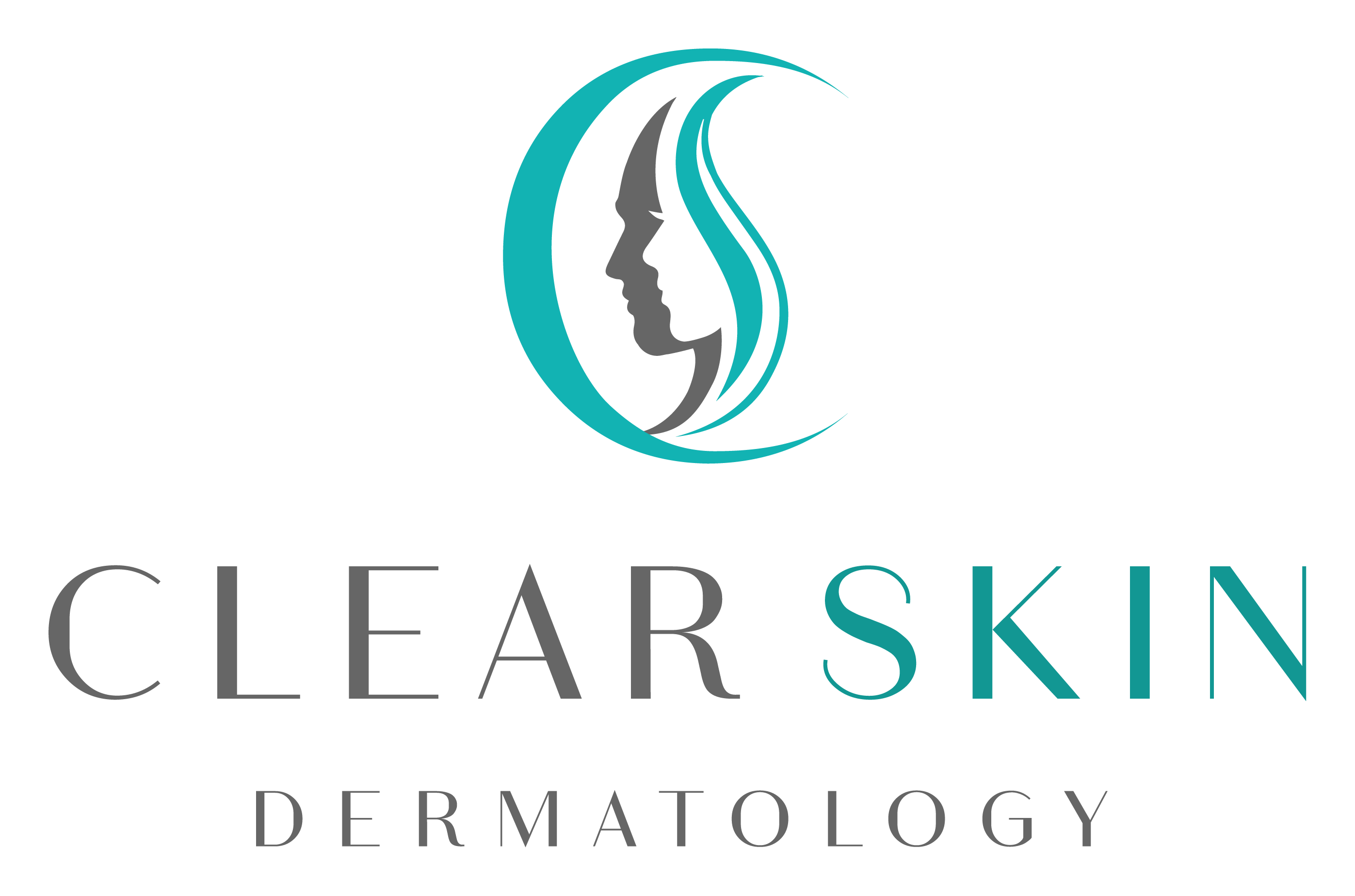Mohs surgery in Clearwater effectively treats basal cell carcinoma, squamous cell carcinoma, and other skin cancers while preserving healthy tissue and minimizing scarring. At Clear Skin Dermatology, Mohs surgery is performed by Dr. Rachel Epstein, a double board-certified dermatologist, who has performed over 25,000 Mohs surgeries and has completed a prestigious fellowship training in Mohs surgery.
Remove skin cancer and
preserve healthy tissue
Mohs surgery is a specialized technique for removing skin cancer. It involves the precise excision of cancerous tissue layer by layer while sparing as much healthy tissue as possible. This outpatient procedure is performed under local anesthesia. After each layer is removed, it is examined under a microscope in an on-site lab to ensure all cancer cells are eradicated. Mohs surgery boasts the highest cure rates for basal cell carcinoma and squamous cell carcinoma, making it the gold standard for treating high-risk skin cancers.
The importance of being a fellowship-trained Mohs surgeon
Dr. Rachel Epstein, our double-board-certified dermatologist at Clearwater, has undergone extensive fellowship training in Mohs Micrographic Surgery. When you choose to work with fellowship-trained surgeons, you’re working with someone who has completed:
- A competitive application, review, and selection process
- Extensive, hands-on training from highly qualified trainers
- 1-2 years of additional training after residency
- Training with rare tumor pathology
- Training in difficult tumor locations
- Complex wound reconstruction techniques
- A minimum of 650 Mohs surgery cases
Choosing a fellowship-trained Mohs surgeon like Dr. Epstein means you are receiving care from a highly trained and experienced professional dedicated to providing the best possible outcomes with the highest cure rates and minimal scarring.

Mohs surgery treats:
- Basal cell carcinoma
- Squamous cell carcinoma
- Recurrent skin cancers
- Skin cancers in cosmetically sensitive areas (e.g., face, ears, hands)
- Skin cancers in areas where tissue preservation is critical
Your Mohs surgery experience
Mohs surgery in Clearwater at Clear Skin Dermatology begins with an initial consultation. Dr. Rachel Epstein will assess your skin cancer and discuss the procedure in detail, answering any questions you may have. This personalized approach ensures that you are well informed and comfortable with the treatment plan. You’ll also receive pre-operative instructions to prepare for the surgery.
On the day of the surgery, you will be given local anesthesia to numb the area. Dr. Epstein will then remove the visible portion of the cancer along with a thin layer of surrounding tissue. This tissue is immediately processed in our on-site lab, where it is examined under a microscope.
If any cancer cells are detected at the margins, Dr. Epstein will map their location and remove additional tissue from the affected areas. This is repeated until all cancer cells are eradicated.
Following the procedure, Dr. Epstein will discuss the wound care and any follow-up treatments. Most patients experience minimal side effects, such as mild discomfort or swelling, which can be managed with over-the-counter pain relief. Recovery time varies depending on the size and location of the treated area, but most patients can resume normal activities within a few days.
Benefits of Mohs surgery:
- Typically cancer is removed within the same day
- Highest cure rates for basal cell carcinoma and squamous cell carcinoma
- Precise removal of cancerous tissue while sparing healthy tissue
- Minimizes scarring and preserves cosmetic appearance
- Outpatient procedure with local anesthesia
- Immediate microscopic examination of tissue margins
- Reduces the need for additional treatments or surgeries
- Effective for treating recurrent or high-risk skin cancers

Mohs surgery FAQs
How does Mohs surgery work?
Mohs surgery works by precisely removing skin cancer layer by layer. During the procedure, the surgeon excises the visible tumor and a thin margin of surrounding tissue. This tissue is then frozen and sectioned into thin layers, which are examined under a microscope. Each layer is meticulously mapped and analyzed to detect cancer cells. If cancer is found at the margins, only those specific areas are further excised. This is repeated until no cancer cells remain, ensuring complete removal while preserving as much healthy tissue as possible.
Who is a candidate for Mohs surgery?
Candidates for Mohs surgery typically include patients with basal cell carcinoma, squamous cell carcinoma, and other high-risk or recurrent skin cancers. It is especially beneficial for cancers in cosmetically sensitive areas or those with indistinct borders.
How long does Mohs surgery take?
The duration of Mohs surgery can vary depending on the size and complexity of the cancer. The procedure generally lasts several hours, as each tissue layer must be carefully removed and examined. Patients should plan to spend the better part of the day at the clinic.
Is Mohs surgery painful?
Mohs surgery is performed under local anesthesia, which numbs the area being treated. Patients may feel some pressure during the procedure but should not experience pain. Mild discomfort or swelling may occur after the anesthesia wears off, which can be managed with over-the-counter pain relief.
What can I expect during the recovery period?
Recovery from Mohs surgery depends on the size and location of the treated area. Most patients experience mild swelling and discomfort, which typically subside within a few days. Dr. Epstein will provide detailed post-operative care instructions to promote optimal healing.
Are there any risks or complications associated with Mohs surgery?
As with any surgical procedure, there are potential risks and complications. These may include infection, bleeding, and scarring. However, Mohs surgery is generally safe, and complications are rare. Dr. Epstein’s extensive training and experience help minimize these risks.
How do I prepare for Mohs surgery?
Dr. Epstein will provide instructions on how to prepare for your surgery. Patients are generally advised to avoid certain medications and supplements that can increase bleeding risk.
Will I have a scar after Mohs surgery?
While Mohs surgery aims to preserve as much healthy tissue as possible, some scarring is inevitable. The extent of the scar depends on the size and location of the treated area. Dr. Epstein uses advanced reconstructive techniques to minimize scarring.
How soon can I return to normal activities after Mohs surgery?
Most patients can resume normal activities within a few days after Mohs surgery. However, it’s important to follow Dr. Epstein’s post-operative care instructions and avoid strenuous activities that might interfere with healing.

Achieve and maintain clear and
healthy skin in Clearwater, FL
Clear Skin Dermatology is a leading provider of comprehensive dermatological care, specializing in advanced treatments like Mohs surgery. Dr. Rachel Epstein, a double board-certified dermatologist and fellowship-trained Mohs surgeon, brings over 12 years of expertise and has performed more than 25,000 successful surgeries. Her meticulous approach ensures the highest cure rates and optimal cosmetic outcomes. Schedule a consultation to discuss how Mohs surgery in Clearwater can help you achieve and maintain clear and healthy skin.


